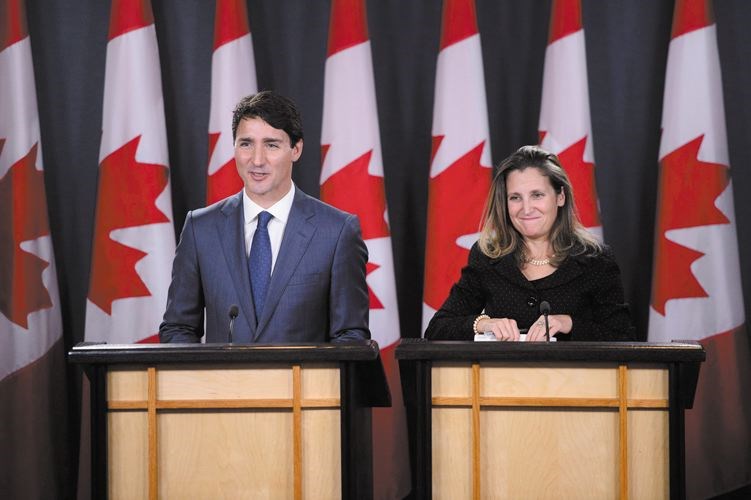We have a deal. It is no longer NAFTA but the United States-Mexico-Canada Agreement, or USMCA.
"It is great deal for all three countries, solves the many deficiencies and mistakes in the NAFTA, greatly opens markets to our Farmers and Manufacturers, reduce Trade Barriers to the U.S. and will bring all three Great Nations closer together in competition with the rest of the world," tweeted Donald Trump.
The U.S. president finished his tweets by writing "The USMCA is a historic transaction!" and in that he is right. Much of what he is doing is historic. It will certainly be analyzed in history textbooks and Ph.D dissertations for all its mistakes.
But is it a great moment in history? No. It is not a high point in our ongoing relationship with the United States. Indeed, as CBSN reported, one analyst said the whole debacle has irreparably damaged U.S.-Canada trade negotiations all for a couple of gallons of milk.
The whole exercise came about due to a lack of understanding of the trade relationship between Canada and the United States by the president. Our goods trade balance is just about even - fluctuating a little on a year over year basis. It is presently sitting about $670 billion with an $8.2 billion surplus going to the United States. In other words, the United States was already getting more from its exports to Canada than it was paying for imports.
Trump's presumption NAFTA was a "bad deal" filled with mistakes and deficiencies was, from a U.S. perspective, not valid. But it was part of his platform. It certainly played to the crowds and energized his base. The idea they were not to blame for their fiscal failures was music to ear of the masses.
We don't know much about the details of the new agreement. We are told it will ensure more auto-parts and automobiles are manufactured in high wage regions. High wages means a minimum of $16 per hour - something of a joke in my opinion. But it is intended to force some Mexican operations to increase the wages they are paying to their employees or shut down.
Whether they will is debatable. What will happen is the cost of a new car will increase. American consumers and by default Canadians as well will pay more for cars manufactured anywhere in North America. The central idea behind all this is higher wages means more money to buy cars so the price increase will be offset. Of course, not everyone works in the automotive industry nor will they see wage increase benefits.
This is the part of all this I really don't understand. There are slightly over 63 million people in the United States who voted for a man who promised to make everything they consume more expensive and more difficult to acquire. Why would people want someone in power who is going to make it more difficult for the average wage earner to afford to live?
The other "big win" for the United States appears to be in the dairy industry. Under the Trans Pacific Partnership, Canada had already agreed to opening up 3.25 per cent of our dairy to foreign inputs. Under the USMCA, it is 3.6 per cent - or a couple of more gallons of milk. If Trump hadn't torn up the TPP and walked away from the discussions, he would have already had his win on this file.
But this is no small potatoes. One estimate places this trade at around $400 million per year which will be lost to Canadian dairy farmers. Not a huge amount in an $18 billion per year industry but the fear is once the doors are opened, how are we going to stop them from opening further?
There are people on both sides of the fence about our dairy supply management system. It ensures all dairy farmers predictability and price stability. They know how much milk they must produce and what they will get when selling it. However, it also means the market is not as competitive as it can be and it previously hadn't been open to international competition.
There is also the whole question of standards regarding the use of growth hormones and antibiotics. I am not a big fan of the paranoia around food additives but just the taste of milk alone south of the border makes me wonder what is in it. I prefer the milk I know to drinking an American import.
What did Canada get out of the deal? It appears we still have no control over our oil and gas production but the dispute mechanisms stay in place. Maybe that's a good thing. We have a deal but were the negotiations worth the time, effort, and money just so Trump could say he kept his promise?



